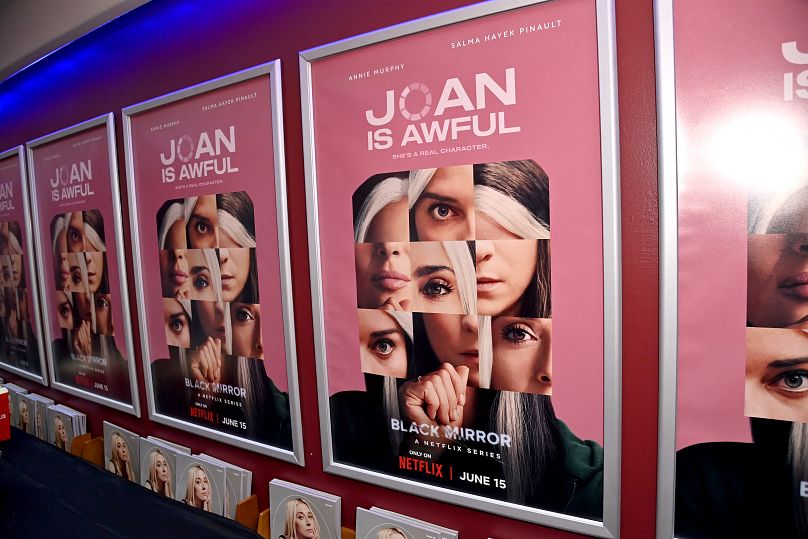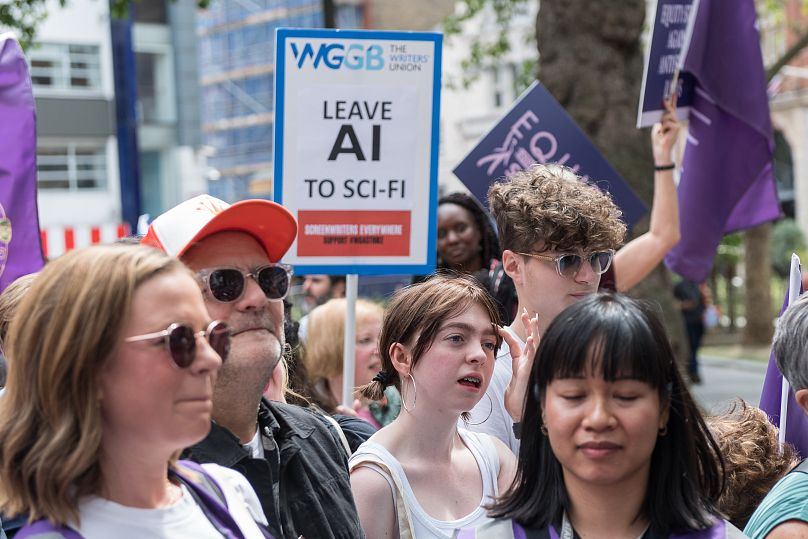Netflix's controversial reality show sees five couples putting their trust to the test - but deep fake science blurs the line of truth and lies. Is it entertainment or a form of technological torture?
Dating shows have a long tradition of pushing the boundaries of appropriateness to make their selves stand out.
From 2010’s Bridalplasty, which saw 12 brides-to-be compete for plastic surgery, to ‘00s horror show Playing It Straight, where a woman had to decide which of 14 men were heterosexual and who were merely pretending, controversy has dogged the genre for years.
As artificial intelligence (AI) becomes ever more prevalent in our day to day lives, it’s unsurprising that producers of reality dating shows would adopt it as a common practice.
In Netflix’s Too Hot to Handle, contestants are watched by an apparently all-seeing cone, who fines them for any sexual acts during their time at a ‘retreat’ where physical contact is banned. In The Circle, players hide behind a screen, creating new personalities for themselves and often flirting in order to win the grand prize.
While those examples are low-key Black Mirror_-esque and mostly harmless, the recently released Netflix show Deep Fake Love (or Falso Amor in the original Spanish) is anything but.
A prescient warning against using AI for entertainment
The Spanish reality dating series crosses the line from the use of AI in a light-hearted, gimmicky way, to employing it as a cruel tactic to make participants suffer.
The show revolves around five couples who are all in serious relationships, some who are engaged and others have been together for years.
Each couple has two things in common - their partnerships are somewhat strained and they don’t know what they’re getting into by choosing to get involved with the frankly horrifying show.
In the first episode, the couples are split up and sent to separate houses called ‘Mars’ and ‘Venus’, both full of single people keen for their 15 minutes of infamy.
At the end of each day, one half of each couple is shown videos of their partner kissing or behaving sexually with the singles.
Watching the reactions of the individuals who are seeing their partners cheating on them and breaking their already fragile trust makes for gutting viewing - but it’s not real.
In fact, it’s not until after the couples are played the traumatic videos - many of them visibly devastated - that they’re told the films could be fake.
Host Raquel Sánchez Silva explains to the participants that the scenarios their partners are being unfaithful in are mostly false, altered with deep fake technology.
With that, the game is afoot.
It turns out there’s an €100,000 prize at stake but it isn’t awarded on the basis of fidelity or trust. Instead, the winners will be the couple who are able to decipher the largest number of videos as either real or deep fake.
As a viewer, we’re told very early on how the AI alterations come apart, showing a split screen of an interaction between two people often behaving entirely innocently on one side and actors going the whole, cheating hog on the other.
The faces of those who don’t cheat are scanned onto those of the actors, while offensive words are literally put into the mouths of others. It’s staggering to watch and quite possibly the most brutal use of AI we’ve seen so far.
A pointless and vicious use of AI
In the first episode, the technology lets one contestant believe that their partner is trashing his five-year relationship as soon as he’s introduced to the singles.
Others are seen to be passionately kissing when, in reality, they didn’t even touch the other person. It’s car crash TV at its very lowest from the off.
As the series progresses and the split up couples face more temptation than ever, it becomes clear that the videos are occasionally real.
The deep fakes get continuously raunchier, with AI used to give the illusion of full-on sex.
In the end, whether or not the individuals are cheating hardly matters. The couples watching the videos are quite obviously traumatised by the very thought of the infidelity, let alone being forced to see the faces of their loved ones in compromising situations. Psychologically, the brain can't easily distinguish between what's real and what isn't.
Unsurprisingly, the misery wrought by the fake videos inspire enough reasonable doubt for participants to shrug off any guilt and pursue their own physical urges, blurring the boundaries of what’s real and what’s fake even more.
At the end of the series, each couple discovers which videos were real and which were fake, driving even more of a wedge between the previously devoted pairings.
Deep Fake Love isn’t just an experiment in causing totally unnecessary psychological damage to the contestants’ personal lives, but also sets a grim precedent for the future of AI.
In Charlie Brooker’s ever-popular Black Mirror series, we’re shown a world in the not-too-distant future where our lives are entirely controlled by technology.
As seen in series six’ ‘Joan is Awful’, Brooker’s script foreshadows an era of ‘automatically generated entertainment’, effectively rendering real life actors redundant - as long as they’re willing to have their likenesses ‘cloned’ for entertainment purposes.
Deep Fake Love only scans contestants' faces, using body doubles for the rest of the savagery, the technology to create full-body deep fakes is constantly improving. It’s likely body doubles could be entirely obsolete in the near future.
Striking over the misuse of AI
This is at the forefront of the minds of many of those currently striking for SAG-AFTRA in Hollywood and the industry as a whole.
One of their main reasons for striking is to “establish a comprehensive set of provisions to protect human-created work and require informed consent and fair compensation when a ‘digital replica’ is made of a performer, or when their voice, likeness, or performance will be substantially changed using AI”.
They’ve made frequent claims that the Alliance of Motion Producers and Television Producers (AMPTP) have failed to do enough to ensure writers and actors are not phased out in favour of digital replicas.
Deep Fake Love, as well as being barbaric to participants who innocently wanted to find fame and perhaps a few thousand euros, proves a dangerous exemplar for the future.
It’s damaging at the human level too. While the appetite for more and more extreme dating shows doesn’t seem to be dying down - more people apply for the UK’s version of Love Island than Oxbridge every year - Deep Fake Love has simply taken it too far.
If trash TV is the floor, Deep Fake Love is in the basement
It is, at its core, trash TV and while that’s usually an appealing prospect for many viewers as ideal water cooler conversation fodder, the Netflix show is simply inhuman in every way.
Life is hard enough, with wildfires raging and inflation seeing people suffer with malnutrition - why on earth did this get the green light?
Uncomfortable viewing can occasionally be entertaining for audiences, especially when it comes to rooting for an underdog. TV companies using deep fakes to destroy relationships as a form of entertainment, though, is nothing short of callous and damaging to participants and viewers alike.
Deep Fake Love is heart-wrenching and absolutely an interesting test of technology's uses, but it should have been left on the cutting room floor or, better yet, never even commissioned.
There’s little surprise that the show is very popular on Netflix so it wouldn’t come as a shock if there are international versions made. There really shouldn’t be though - it’s not just the most heinous piece of programming in recent years but also serves as a significant warning about the dangers of using AI for entertainment purposes and in real life.
Deep Fake Love is streaming now on Netflix.







